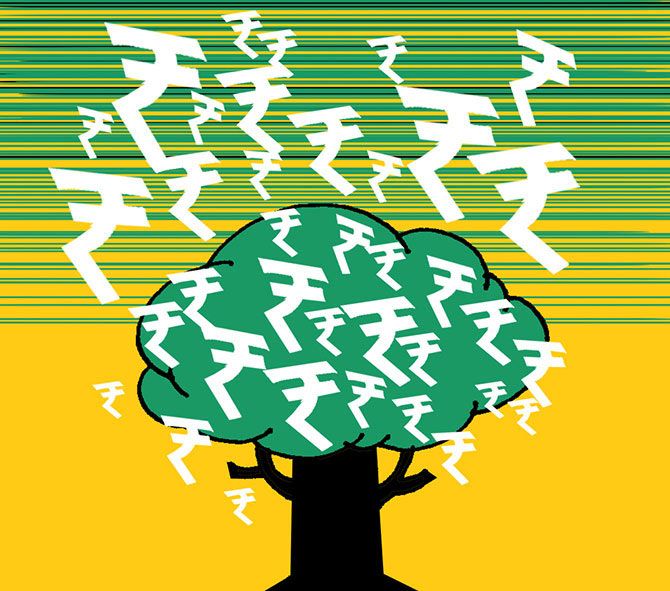Taxation has played spoilsport despite double digit returns, points out Tinesh Bhasin.
Illustration: Dominic Xavier/Rediff.com

To bring the National Pension Scheme (NPS) on par with the Employees Provident Fund (EPF), the Pension Fund Regulatory and Development Authority (PFRDA) has recently sought parity of taxation between the two retirement products in the upcoming Union Budget.
At present, EPF enjoys the EEE (exempt-exempt-exempt) tax treatment while NPS is subjected to EET (exempt-exempt-tax).
This move has made NPS unpopular among the salaried because when an individual would withdraw his corpus from the former, he has to pay tax on 20% of the final corpus, according to his tax bracket.
If the finance minister corrects the tax disparity, most salaried people should prefer the NPS as it has delivered better returns, say investment advisors.
"The way it is structured, NPS is the best retirement product," says Suresh Sadagopan, a Mumbai-based financial planner.
"It continues to get better as the regulator introduces more innovative options for subscribers like lifecycle investing," he adds.
"To the salaried, our first recommendation is EPF and then NPS due to tax on withdrawal in the latter. If the disparity is sorted, it will be the obvious choice," says Sadagopan.
There are some who believe that PFRDA should not compare NPS with EPF.
"The objective of NPS was to provide the non-salaried a better pension product. Instead of focussing on that segment, PFRDA seems to be pushing the product for the salaried," says Manoj Nagpal, CEO, Outlook Asia Capital.
If NPS generates just 1% more returns than EPF rates every year, he explains they will still be on par despite the tax on withdrawal.
The two should not be compared as they are structured differently, says Nagpal.
While NPS generates market-linked returns, EPF has a component of defined benefit pension and life insurance.
NPS is an "obvious" choice for investment managers also because it has consistently delivered double-digit returns in the past five years.
In the central government plans, the LIC Pension Fund, the SBI Pension Fund and the UTI Retirement Solutions have returned 11.38%, 11.37% and 11.23% respectively.
The three fund managers have delivered similar returns for state government plans too.
If a government employee had invested Rs 5,000 a month for five years, he would now have a corpus of over Rs 4 lakh on a total investment of Rs 3 lakh.
On maturity, the NPS subscriber needs to mandatorily buy an annuity plan with 40% of the money.
Of the remaining 60% corpus, he can withdraw 40% without paying any tax.
The actual tax, therefore, is on the 20% of the entire corpus.
"In the current structure, pensioners can benefit even if the government makes annuity returns tax-free," says Sadagopan.
The returns from annuities depend on interest rate movement.
At present, returns are in the range of 4.5% to 5.5%.
Retirees should get at least 7% considering inflation, according to investment managers.
The government, in the previous Budget, had proposed that it will tax 40% of the corpus, when a subscriber withdraws money from EPF. But it faced backlash from the salaried and later withdrew the proposal.











